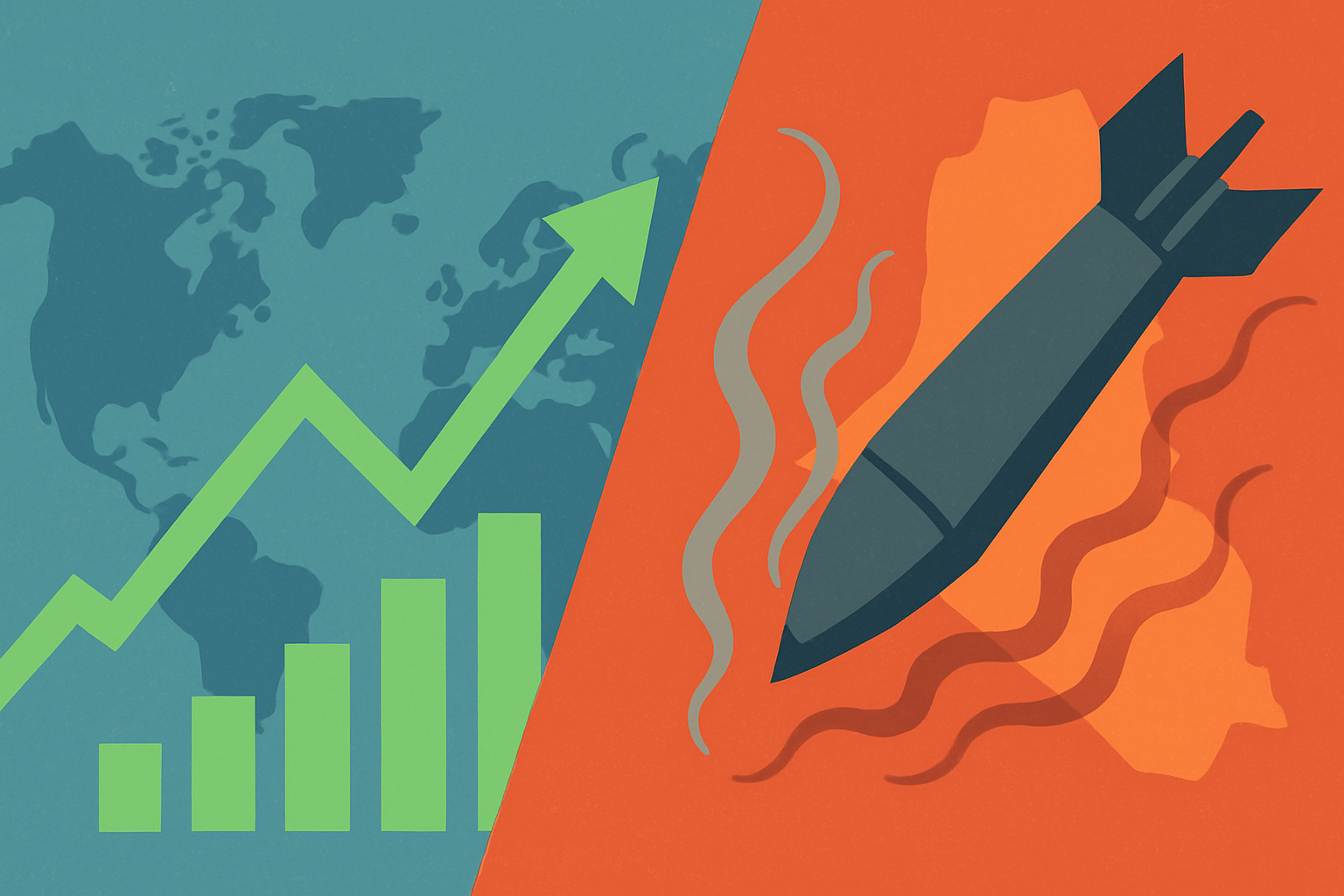Global stock markets posted a strong rally following U.S. President Donald Trump’s announcement of a ceasefire agreement between Iran and Israel, temporarily easing fears of broader conflict in the Middle East. While equity markets welcomed the truce, analysts and defense watchers quickly flagged signs of continued missile activity—underscoring how fragile the geopolitical situation remains.
The result: a short-term risk rally with undercurrents of instability. Oil prices fell sharply—over 3%—on hopes that supply disruptions could be avoided. Gold, too, slipped as demand for traditional safe-haven assets cooled amid a return to risk-on sentiment.
But for investors, the picture is far from black and white.
Global Markets Respond to Truce Hopes
The announcement of a ceasefire between two of the region’s most entrenched adversaries triggered a swift positive response across global indices:
- The S&P 500 climbed 1.4% by mid-day trading Tuesday.
- Europe’s STOXX 600 gained 1.1%, led by energy and industrial names.
- The Nikkei 225 jumped 1.9%, recovering ground lost last week amid war-related jitters.
According to Investopedia, energy and defense stocks saw diverging trends: oil producers pulled back, while companies like Lockheed Martin (LMT) and Northrop Grumman (NOC) remained buoyant due to continued defense uncertainty.
Meanwhile, Brent crude fell below $81 per barrel, marking its largest one-day decline since April, per data from Reuters.
Why This Matters for Investors
Geopolitical events often inject significant volatility into markets. Historically, initial ceasefire announcements tend to trigger relief rallies, especially in sectors tied to global trade and energy. However, the durability of such truces is what ultimately dictates market direction.
Even after President Trump’s address, Israeli military sources reported incoming projectile activity from Hezbollah positions in southern Lebanon, as noted by MarketWatch.
“The markets are pricing in hope, not certainty,” said Sarah LaGrange, global macro strategist at Vanguard. “Investors should treat this rally as tactical, not structural—until we see a sustained de-escalation.”
Energy, Defense, and Metals in the Spotlight
Oil & Gas:
While oil prices dipped, the medium-term outlook remains uncertain. If the ceasefire collapses, disruptions to Strait of Hormuz traffic—a critical artery for global oil—could cause price spikes. Keep an eye on oil ETFs like XLE and midstream plays like Kinder Morgan (KMI).
Defense Stocks:
Despite the ceasefire, continued threats in the region mean defense names may still benefit from elevated government spending. Lockheed, Raytheon, and BAE Systems remain positioned for growth if tensions persist.
Precious Metals:
Gold prices dropped nearly 1.8%, per MetalsDaily, as investors shifted risk appetite. Still, with global volatility on a knife’s edge, gold and silver may yet return to favor as uncertainty lingers.
Key Investment Insight
Short-term rallies driven by geopolitical events should be approached with measured caution. Investors may consider:
- Hedging strategies through volatility-focused ETFs like VIXY or precious metals funds.
- Staggered entry into emerging market equities, which tend to overreact to global conflict headlines.
- Selective rotation into defensive sectors such as healthcare, utilities, and dividend-focused ETFs until clarity improves.
Trends to Watch Next
1. Truce Sustainability
How long the ceasefire holds will determine sectoral winners and losers. Watch defense updates from the U.S. State Department and Israeli military briefings.
2. Oil Inventories & Shipping Lanes
Keep tabs on OPEC+ announcements and traffic flow through the Strait of Hormuz. Any disruption could quickly reverse recent oil price declines.
3. Central Bank Sentiment
If tensions ease and oil remains low, central banks may face less inflation pressure—potentially supporting risk assets further. Statements from the Fed and ECB will be crucial in the days ahead.
Global headlines can drive dramatic shifts in sentiment—but investors need to differentiate noise from signal. As the Iran-Israel ceasefire unfolds, maintain a flexible yet cautious posture, stay diversified, and monitor developments with precision.
For more high-impact, real-time insights that help you move with the market—not behind it—stay locked in with MoneyNews.Today.





